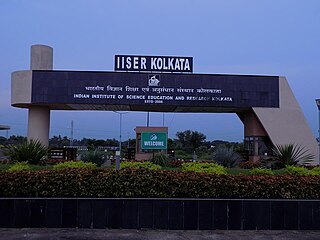
Visvesvaraya Technological University (VTU), is a collegiate public state university in Belagavi, Karnataka established by the Government of Karnataka. It is one of the largest Technological Universities in India with 26 years of Tradition of excellence in Engineering & Technical Education, Research and Innovations. It came into existence in the year 1998 to cater the needs of Indian industries for trained technical manpower with practical experience and sound theoretical knowledge. The university is named after Sir M. Visvesvaraya, an Indian civil engineer, statesman and the 19th Diwan of Mysore.
The National Institutes of Design (NIDs) are a group of autonomous public design universities in India, with the primary institute, founded in 1961, in Ahmedabad, with extension campuses in Gandhinagar and Bengaluru. The other NIDs are located in the cities of Kurukshetra, Vijayawada, Jorhat and Bhopal. The NIDs function autonomously under the Department for Promotion of Industry and Internal Trade (DPIIT), Ministry of Commerce and Industry, Government of India. The NIDs are recognised by the Department of Scientific and Industrial Research of the government's Ministry of Science and Technology as a scientific and industrial research organisation. The universities are accorded Institutes of National Importance under the National Institute of Design Act, 2014.
Joint Entrance Examination – Main (JEE-Main), formerly All India Engineering Entrance Examination (AIEEE), is an Indian standardised computer-based test for admission to various technical undergraduate programs in engineering, architecture, and planning across colleges in India. The exam is conducted by the National Testing Agency for admission to B.Tech, B.Arch, etc. programs in premier technical institutes such as the National Institutes of Technology (NIT) and Indian Institutes of Information Technology (IIIT), which are based on the rank secured in the JEE-Main. It is usually conducted twice every year. Since mid of 2019, the JEE has been conducted fully online as a computerised test.

Maulana Azad National Institute of Technology Bhopal is a public technical university located in Bhopal, Madhya Pradesh, India. It is part of a group of publicly funded institutions in India known as National Institutes of Technology. It is named after the Independent India's first Minister of Education (India), scholar and independence activist Abul Kalam Azad who is commonly remembered as Maulana Azad.
The Joint Entrance Examination (JEE) is an engineering entrance assessment conducted for admission to various engineering colleges in India. It is constituted by two different examinations: the JEE-Main and the JEE-Advanced.

School of Planning and Architecture Delhi is a higher education federal institute located in Delhi, India specializing in education and research, and serving as the national centre of excellence, in the fields of planning and architecture. The institute primarily offers undergraduate, postgraduate, doctoral and executive education programs. It forms part of the league with other two Schools of Planning and Architecture, namely SPA Bhopal and SPA Vijayawada established by the Government of India to provide quality Architecture and physical planning education.

Indian Institutes of Science Education and Research (IISERs) are group of prestigious autonomous institutions for teaching and research in natural science established by the Government of India through the Ministry of Education to provide collegiate education in Basic Sciences integrated with research at the undergraduate level. The institutes were formally established by the Parliament of India through the Science Education and Research (Amendment) Act, 2010. Seven IISERs have been established across the country, namely IISER Pune in Maharashtra, IISER Bhopal in Madhya Pradesh, IISER Mohali in Punjab, IISER Kolkata in West Bengal, IISER Thiruvananthapuram in Kerala, IISER Tirupati in Andhra Pradesh, and IISER Berhampur in Odisha. All IISERs were declared as Institutes of National Importance by the Parliament of India in 2012, to promote them as leading institutions in the country in the field of basic sciences along with its sister institutes like Indian Institute of Science, Bangalore. The financial outlay for each IISER is around ₹5 billion (US$63 million) for the first five years of establishment.

Madhav Institute of Technology and Science, formerly known as Madhav Engineering College and commonly referred to as MITS Gwalior, is a government-aided UGC autonomous & NAAC A++ Accredited institute founded in 1957 and located in Gwalior in the state of Madhya Pradesh, India. The institute is operated by the Scindia Engineering College Society. The institute offers bachelor's, master's and doctoral degrees in engineering along with Bachelor in Architecture and Master's in Computer Application.

Indian Institute of Science Education and Research, Bhopal is an autonomous research institute in Bhauri, Bhopal district, Madhya Pradesh, India. It was established by the Ministry of Education (India), Government of India in 2008 in order to incorporate research in fundamental science at undergraduate and graduate level, with equal emphasis on higher education for research and education in science. It is an autonomous institution awarding its own degrees.
The Indian Institutes of Technology (IITs) are a network of engineering and technology institutions in India. Established in 1950, they are renowned for their academic excellence. They are under the ownership of the Ministry of Education of the Government of India and are governed by the Institutes of Technology Act, 1961. The Act declares them as Institutes of National Importance and lays down their powers, duties, and framework for governance as the country's premier institutions in the field of technology. The act currently lists twenty-three IITs. Each IIT has autonomy and is linked to others through a common council called the IIT Council, which oversees their administration. The Minister of Education of India is the ex officio chairperson of the IIT Council.
The National Aptitude Test in Architecture (NATA), is conducted by National Institute of Advanced Studies in Architecture (NIASA), which is a body of Council of Architecture, New Delhi in India. The National Aptitude Test in Architecture is a national level examination for admission to undergraduate courses in architecture. The test measures the aptitude of applicants for a specific field of study in areas like drawing and observation skills, sense of proportion, aesthetic sensitivity and critical thinking, qualities that have been acquired over a long period of time and that are related to architecture.

The School of Planning and Architecture, Vijayawada is a higher education institute in Vijayawada, India, specializing education and research in the field of urban planning and architecture. It is one of the two School of Planning and Architecture (SPAs) established by the Ministry of Human Resource Development, Government of India in 2008 as an autonomous institute and a fully Centrally Funded Technical Institution (CFTI). It forms a part of the league along with the other two SPAs: SPA Bhopal and SPA Delhi.
Two major engineering entrance examinations are used for admission to engineering institutes across India, Indian Institute of Technology Joint Entrance Examination (IIT-JEE) and All India Engineering Entrance Examination (AIEEE). In 2010, a proposal for a common engineering entrance examination was made by the Ministry of Human Resource Development. The proposal has gone through several names and formats, and is expected to enter use in 2024. Yet, the common entrance exam for all engineering courses in India has not become effective, even for academic year 2021–22.

Oriental Institute of Science & Technology (OIST) is a private engineering college located in Bhopal, Madhya Pradesh, India, owned by the private group "Oriental Group of Institutes". It is affiliated with the Rajiv Gandhi Proudyogiki Vishwavidyalaya.

The School of Planning and Architecture, Bhopal is a higher education institute in Bhopal, Madhya Pradesh, India, specializing in education and research in the field of Urban Planning, Architecture and Design. It is one of the two Schools of Planning and Architecture (SPAs) established by the Ministry of Education, Government of India in 2008 as an autonomous institute and a fully Centrally Funded Technical Institution (CFTI). It is one of the Institutes of National Importance of MoE India along with IITs, NITs and AIIMS. It forms a part of the league along with the other two SPAs: SPA Vijaywada and SPA Delhi. In 2014, Lok Sabha passed a bill to make all the three SPAs "centres of excellence" on the pattern of IITs and IIMs.
India has the largest numbers of engineers as well as the largest number of engineering education institutes and infrastructure in the world. As of 2021, India annually produces 1.5 million engineering graduates. India's technical education infrastructure includes 2500 engineering colleges, 1400 polytechnics and 200 schools of planning and architecture.

Gandhi Institute For Technology (GIFT), Autonomous College, Bhubaneswar, is a prestigious engineering institution in Odisha, India. Established in 2007 by the Balaram Panda Trust, the college has gained recognition for its academic excellence and achievements. It holds the esteemed "Gandhi Award" for "Best Engineering College of Orissa State-2021" from the Indian Society for Technical Education (ISTE), New Delhi. The college is affiliated with BPUT and approved by AICTE, holding an ISO 9001:2008 certification. GIFT is ranked 29th in India, labeled as a 'Band Excellent' institution in the ATAL Ranking of Institutions on Innovation Achievements (ARIIA) by the Ministry of Education for 2021-22. Notably, it secured the 5th position among Top Engineering Colleges of Excellence in India and 1st in Odisha in the CSR-GHRDC Engineering Colleges Survey. The college is accredited by NBA, IAO, and NAAC with 'A++' Grade, recognized as a research center by 'Scientific & Industrial Research Organization (SIRO)' by the Ministry of Science & Technology, Govt. of India. Acknowledged for its contributions, GIFT is a remote center to IIT Bombay and IIT Kharagpur for ISTE workshops and is renowned for hosting leading recruiters in the country.

DIT University is an Indian private university in Dehradun, Uttarakhand. Founded by Naveen Agarwal in 1998, the University Grants Commission conferred autonomous status to DIT in 2012 and subsequently it was declared DIT University by Uttarakhand Legislative Assembly vide Act No. 10 of 2013. DIT University has been accorded by the National Assessment and Accreditation Council with Grade A.

Institute Of Engineering & Science IPS Academy Indore is an Autonomous engineering education institution affiliated to RGPV BHOPAL under UGC guidelines, located at Indore city beside NH-3 in Madhya pradesh state, India. It was established in Indore on 19 October 1999 after securing approval of the All India Council for Technical Education, New Delhi, and Government of Madhya Pradesh to commence in the 1999–2000 academic year. It ranks among the top 45 private engineering institutions in India.













